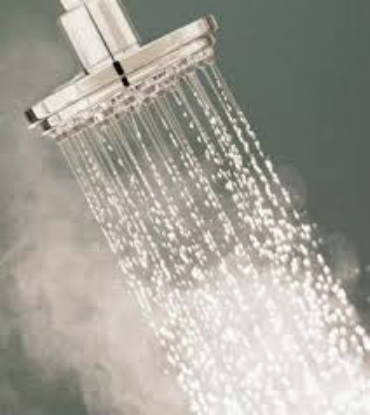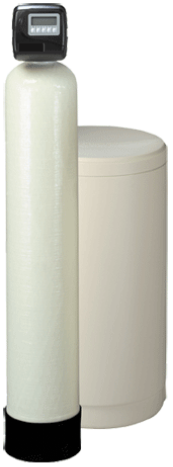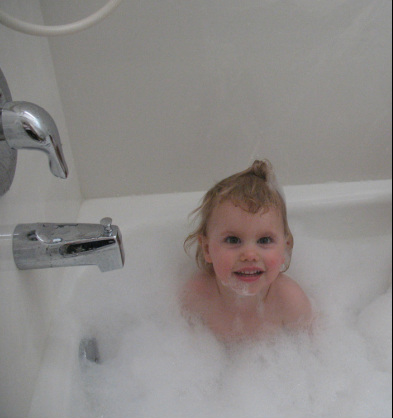Excellent Price on Water Heaters and Water Softeners!
Water Softeners
How does a water softener work?
Hard water is softened by removing the calcium and magnesium it contains. When hard water passes through the softening system's resin bed, it exchanges the hard ions in the water for soft ones, so softened water passes through your pipes, appliances, and faucets.
At Four Seasons Plumbing Water Heaters & Softeners we install SENTRY II Series 960 On-Demand High Efficiency Water Softeners.
The SENTRY II is believed to be the best water softener system with benefits that customers can enjoy every day.
Features
Saves up to 50% in salt and uses less water by regenerating only when necessary.
The 1” full port design allows for the highest flow rates available in a 1” system.
The electronic microprocessor keeps track of the amount of water used each day and adjusts itself to match your needs.
State of the art electronic microprocessor backs up the program memory without the use of a battery.
Reserve capacity is self-adjusting to ensure a continuous supply of conditioned water.
Premium quality water softening resin to ensure trouble free operation.
Reduces the effect of scale build up in your water heater and water lines.
Extends the life of dishwashers, washing machines and water heaters.
Reduces the amount of detergent and soap requirements by up to 70%.
Clothes washed in conditioned water last longer, colors stay brighter, and come out cleaner and softer.
Helps control spotting on glasses and tableware.
Helps reduce skin irritations and adds a healthy luster to hair, leaving it soft and easy to groom.
Water Heaters
There are two major types of units: standard-tank water heaters and tankless water heaters.
Standard-tank water heaters
Most homes use a standard tank water heater. These have a gas burner, or electric element to heat a large-capacity reservoir of water. It’s constantly running so when you turn on a faucet for hot water, it sends that heated water out and starts heating more. However, because there is a gallon capacity on the size of your water heater, you may run out of hot water if you run it for too long.
Typically, most homes have 40 gallon or 50-gallon water heaters. Large homes might require a bigger unit, though. Overall, the cost of the unit and installation of a standard water heater is cheaper than a tankless unit, but their life-span isn’t as long. So if you intend to stay in your home for a long time, or you may be moving soon, this is something to consider.
Tankless Water Heaters
Tankless water heaters are a newer technology, but are catching on because they take up less space than a standard water heater, and they can provide endless hot water. Instead of holding a large reservoir of water, the unit heats water “on-demand,” or as you need it. This means it might take longer to get warm water to your faucet unless you have a re-circulating system installed, but once it’s hot, it will stay that way.
Tankless water heaters are also more efficient than standard units. Sometimes the access to unlimited hot water means people use more, eliminating potential energy savings. The main drawback of tankless water heaters is the installation cost, which usually can be more than double the price of a standard unit.
There are two major types of units: standard-tank water heaters and tankless water heaters.
Standard-tank water heaters
Most homes use a standard tank water heater. These have a gas burner, or electric element to heat a large-capacity reservoir of water. It’s constantly running so when you turn on a faucet for hot water, it sends that heated water out and starts heating more. However, because there is a gallon capacity on the size of your water heater, you may run out of hot water if you run it for too long.
Typically, most homes have 40 gallon or 50-gallon water heaters. Large homes might require a bigger unit, though. Overall, the cost of the unit and installation of a standard water heater is cheaper than a tankless unit, but their life-span isn’t as long. So if you intend to stay in your home for a long time, or you may be moving soon, this is something to consider.
Tankless Water Heaters
Tankless water heaters are a newer technology, but are catching on because they take up less space than a standard water heater, and they can provide endless hot water. Instead of holding a large reservoir of water, the unit heats water “on-demand,” or as you need it. This means it might take longer to get warm water to your faucet unless you have a re-circulating system installed, but once it’s hot, it will stay that way.
Tankless water heaters are also more efficient than standard units. Sometimes the access to unlimited hot water means people use more, eliminating potential energy savings. The main drawback of tankless water heaters is the installation cost, which usually can be more than double the price of a standard unit.
Our Specialties are Water Heater Installation and Replacements, Water Heater Repairs, and Water Softeners.
Providing water heater replacement for a leaking water heater and water softener replacement for a leaking water softener, other plumber services for Cottonwood Heights, Utah and surrounding areas. Including Sandy, Murray, Midvale, Salt Lake City, Holladay, West Jordan, South Jordan, Draper, Bluffdale, Riverton, Taylorsville, South Salt Lake, Herriman, West Valley City, Alta, and more. We are some of the best plumbers in the USA for your water softener, electric water heater and gas water heater systems.







